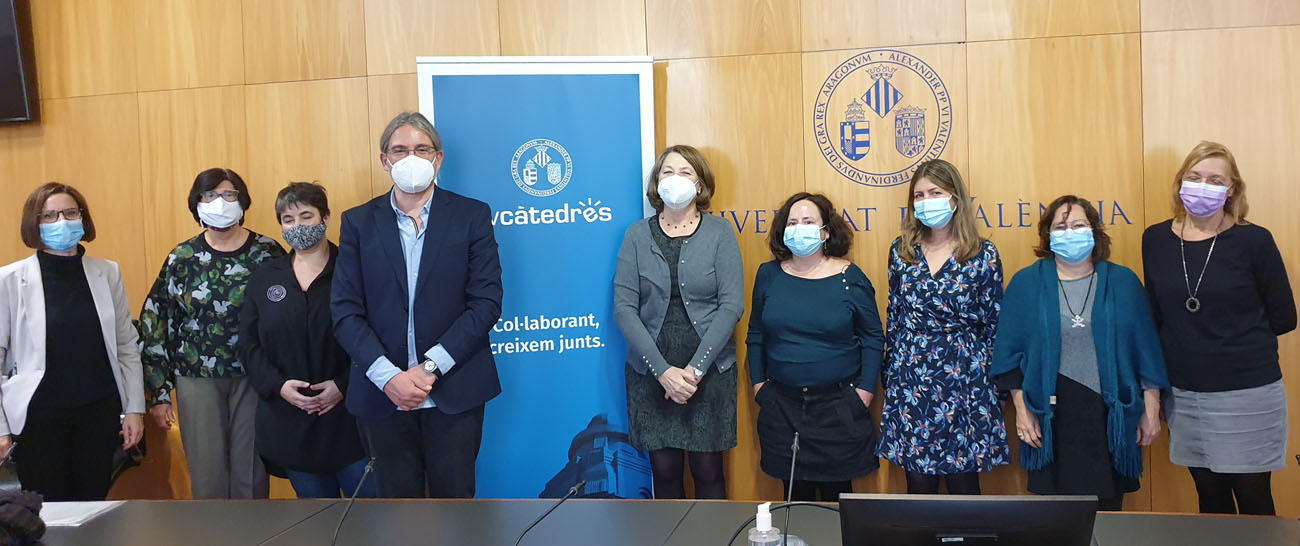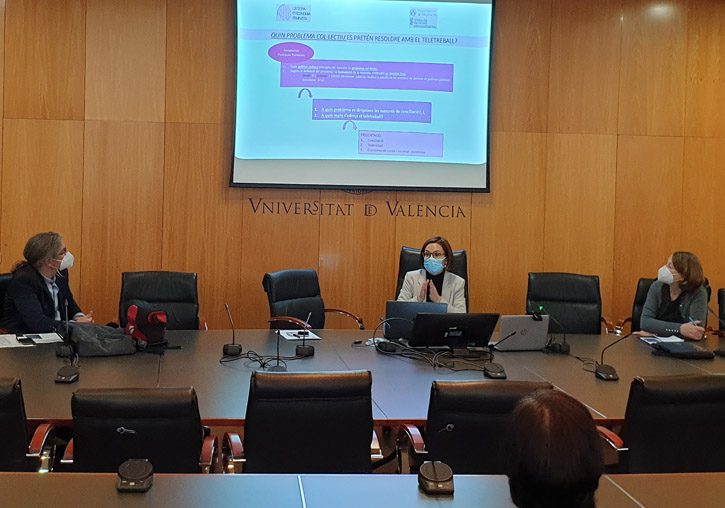
The Chair for Feminist Economics of the University of Valencia (UV) has published the reports of the researcher and professor of Economic Structure of the Carmen Castro institution “Gender gaps in the Valencian Community” and “Towards a transformative and feminist economy. Also Telework versus Conciliation”, by Rosa Roig, researcher and professor of Political Science. These works deal with how to face the situation caused by the COVID-19 pandemic from the Feminist Economy and have been presented as part of the activity of the 2020 Chair.
“Feminist economics values activities that do not produce tangible goods, but that are essential to maintain life, families, in short, the social structure. The idea that without those, life cannot be sustained should be the foundation and justification of socioeconomic policies”, said Ana Marrades, director of the Chair of Feminist Economics and professor of Constitutional Law. In this sense, “it is very important that the Valencian Government study the inequalities and differences between women and men in the use of time for reproductive and care work, as well as the economic value they have”.
“With these reports, coordinated from the work axis on Feminist Economy and change in the economic model, it is intended to broaden the perspectives of analysis of the Valencian economy in the face of COVID-19 and identify some of the most significant challenges from the feminist economy”, Carmen Castro highlighted. The researcher explains that the research work carried out “makes visible the persistence of gender gaps in the Valencian Community, the chronification of occupational segregation and the greater impoverishment that affects Valencian women, to whom it is urgent to pay attention”.
Alba Catalán Piera also participated in the report “Towards a transformative and feminist economy”. It highlights the importance of the role of care as an ethical code to rethink the productive model of the Valencian Community and as a basic social right with great transformative potential. Among the conclusions are “the consideration of the care economy as a lever policy for the change of the economic model and the need to apply the approach of sustainability of life in the adaptations required by the productive sectors of the Valencian economy”, explains Castro. Mª Luisa Moltó Carbonell and Alba Catalán Piera participated in the “Gender gaps in the Valencian Community” report.
Rosa Roig, a ROCOGIS researcher, for her part, studies teleworking and work-life balance from the analytical perspective of the public policy-making process, specifically the initial phase of defining the collective problem. Based on the analysis of the normative frameworks that regulate these policies and the first empirical data on teleworking during the ROCOGIS state of alarm, she concludes that teleworking does not solve the challenge of reconciling work, personal and family life.
“Teleworking is a mechanism to introduce a new work modality and, therefore, it cannot solve this problem that affects both the labour market and the family unit, articulated around the traditional sexual division of labour, where women have the social duty to assume the role of mother-wife-caregiver for free in the family”, she pointed out.
“The issue of the care economy is much more complex, and requires instruments that go beyond remote work and freedom in time management. The economy system continues to revolve around the idea of productive activity and non-productive activity from Adam Smith, where the care economy has no place”, explained Rosa Roig. In her opinion, “the solution is through the socialisation of care with an active responsible role on the part of the State, which implies a reform of the legal framework, an increase in investment in infrastructures of the social protection system and a cultural change”.
In the research and transfer conference “The feminist economy in the face of the COVID-19 crisis”, held on Friday, December 11 at the Rectorate of the University of Valencia, also participated María Dolores Real, vice-rector for Innovation and Transfer of the UV; Rebeca Torró, regional secretary for Sustainable Economy, Productive Sectors, Commerce and Consumption; and José Vicente Soler, general director of Sustainable Economy.
Thus, María Dolores Real, explains that “it is the objective of the University of Valencia to put its research capacity at the service of improving Society. In this case, providing solutions to one of the great challenges of our time, such as creating a more just, feminist and inclusive society, where women and men walk in equality”. In this sense, the vice-rector has committed to continuing the collaboration between the Valencian Government and the University of Valencia through the Chair for Feminist Economics.
For her part, Rebeca Torró highlights the gender work carried out in collaboration with the Chair of Feminist Economics of the University of Valencia to contribute the feminist perspective in the set of economic policies of the Valencian public administration. Thus, the reports prepared by the topics discussed have been positively valued: in the field of care and on the incidence of these in labour relations and in the Valencian economy; in the study of social and economic inequalities, and the incidence in terms of vulnerability from the gender perspective. The need to consider the gender perspective as key and transversal in the process of changing the production model has also been analysed, as well as in the framework of the Valencian Strategy for Recovery.
The general director of Sustainable Economy, José Vicente Soler, explained that in the Valencian Government’s budget project for 2021, the proposal is to increase the contribution of the Valencian Government in this chair by 10,000 euros (up to 40,000). “In 2021 it should continue to be a reference for transfer and applied research, fundamental facts for the government and management proposal”, said Soler.
2020 events
On Friday 21, it was also explained that webinars have been carried out on three specific topics: time, jobs and income for a new social pact; rethinking the production model for the next decade; and systems of care. This last topic was developed within the framework of the II International Congress on Care, Equality and Diversity in the COVID-19 Era.
Chair for Feminist Economics
The Chair for Feminist Economics (FemEconomiaFeminista) of the University of Valencia (UV) and the Department of Sustainable Economy, Productive Sectors, Commerce and Labour of the Valencian Government (GV) was born with the purpose of incorporating the gender perspective in studies, the analysis and application of the Economy in the Valencian Community from the university level through the realisation of different training, research and dissemination activities. The general objective of the chair is to promote a feminist view of the economy and generate critical thinking without gender biases.
You can consult the reports in this link.
Chair for Feminist Economics website.
Photo caption annex:
Presentation of the reports at the Rector's Office of the University of Valencia, last December 11.
Images:
.jpg)












